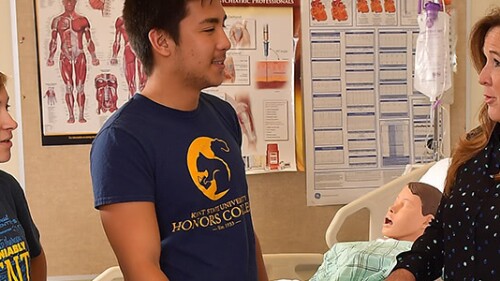
Autism Spectrum Disorders
The Graduate Certificate in Autism Spectrum Disorders at Kent State University is an online program designed to equip educators, counselors, and healthcare professionals with the skills needed to support individuals with autism. This program provides a deep understanding of autism spectrum disorders and evidence-based strategies for intervention. Whether you’re enhancing your expertise or pursuing a specialization, this flexible online certificate helps you make a meaningful difference in the lives of individuals with autism.
Autism Spectrum Disorders Graduate Certificate Program Overview
The Autism Spectrum Disorders graduate certificate prepares students for understanding and addressing the needs of individuals with autism across the spectrum, across the lifespan and in varied contexts, including general and special education classrooms and community settings. Students gain knowledge and skills related to diagnostic and learning style characteristics, causes and medical intervention, early signs and assessment protocols, social-communicative development and disorders, theoretical models and implications of those models for intervention, family characteristics and evidence-based intervention practices.
This certificate is most relevant for students who want to specialize in autism spectrum disorders and/or professionals assuming leadership roles in supporting individuals on the spectrum and their families in the programs and organizations in which they work.
Program Learning Outcomes
Graduates of this program will be able to:
- Describe the diagnostic and learning style characteristics of individuals with autism spectrum disorder.
- Identify early signs of autism spectrum disorder and identify and evaluate instruments used to screen for and diagnose autism spectrum disorder in children and adults.
- Identify neurobiological and environmental factors implicated in the etiology of autism spectrum disorder.
- Describe medical and complementary and alternative medical interventions used by individuals with autism spectrum disorder.
- Compare the social-communicative development of individuals with autism spectrum disorder to that of neurotypically developing individuals.
- Describe different theoretical models for understanding autism spectrum disorder.
- Implement evidence-based interventions to address the needs of individuals with autism spectrum disorder.
Autism Spectrum Disorders Graduate Certificate Program Admissions Requirements
For more information about graduate admissions, visit the graduate admission website. For more information on international admissions, visit the international admission website.
- Bachelor’s degree from an accredited college or university
- Minimum 2.750 GPA on a 4.000-point scale
- Official transcript(s)
- Goal statement
- Two letters of recommendation
- English language proficiency - all international students must provide proof of English language proficiency (unless they meet specific exceptions to waive) by earning one of the following:1
- Minimum 79 TOEFL iBT score
- Minimum 6.5 IELTS score
- Minimum 58 PTE score
- Minimum 110 DET score
1International applicants who do not meet the above test scores will not be considered for admission.
Program Courses
Program Requirements
| Code | Title | Credit Hours |
|---|---|---|
| Certificate Requirements | ||
| SPA 54010 | SOCIAL COMMUNICATION DEVELOPMENT AND DISORDERS IN AUTISM SPECTRUM DISORDERS | 3 |
| SPA 54030 | AUTISM SPECTRUM DISORDERS OVER THE LIFESPAN | 3 |
| SPA 54309 | AUTISM SPECTRUM DISORDERS: THEORY AND DIAGNOSIS | 3 |
| SPED 53030 | APPLIED BEHAVIOR ANALYSIS I: THEORY AND TECHNIQUES | 3 |
| SPED 63959 | MEDICAL ASPECTS OF LIFESPAN DISABILITIES | 3 |
| Certificate Elective, choose from the following: | 1-3 | |
| SPA 64096 | INDIVIDUAL INVESTIGATION:SPEECH PATHOLOGY AND AUDIOLOGY | |
| SPA 64098 | RESEARCH | |
| SPED 53031 | APPLIED BEHAVIOR ANALYSIS II: APPLICATION | |
| SPED 63949 | AUTISM SPECTRUM DISORDER CAPSTONE | |
| SPED 63996 | INDIVIDUAL INVESTIGATION IN SPECIAL EDUCATION | |
| Minimum Total Credit Hours: | 16 | |
Autism Spectrum Disorders Graduate Certificate Program Tuition and Fees
Ohio Residents
| Per Credit Hour | Per 3-Credit Course | Approximate Tuition Cost |
| $612.62 | $1,837.86 | $9,800 part-time1 $6,700 full-time2 |
Non-Ohio Residents
| Per Credit Hour | Per 3-Credit Course | Approximate Tuition Cost |
| $622.62 | $1,867.86 | $9,900 part-time3 $6,800 full-time4 |
1The $612.62 per-credit-hour tuition rate applies to part-time Ohio resident graduate students taking fewer than 11 credit hours per semester.
2The flat-rate semester fee of $6,724.36 applies to full-time Ohio resident graduate students taking between 11-18 credit hours per semester.
3The $622.62 per-credit-hour tuition rate applies to part-time non-Ohio resident graduate students enrolled in a fully online degree program and taking fewer than 11 credit hours per semester, PLUS a surcharge of $10 per credit hour.
4The flat-rate semester fee of $6,724.36 applies to full-time non-Ohio resident graduate students enrolled in a fully online degree program and taking between 11-18 credit hours, PLUS a surcharge of $10 per credit hour of actual credits taken (between 11-18 semester credits or $120-$180).
- An additional Distance Learning fee for all students enrolled in a distance learning course is $15 per credit hour. Program tuition and costs are estimated and subject to change.
- Actual tuition costs will vary based on a student’s chosen academic plan. The full cost of attendance consists of tuition and fees, and when applicable, food, housing, books, course materials, supplies and equipment, transportation and personal expenses for the enrolled terms. Other expenses not included in tuition and fees totals can be found on the Kent State University cost of attendance web page.
- For a complete listing of tuition rates for approved online programs, please contact Kent State’s Financial, Billing & Enrollment Center at 330-672-6000 or via our website Contact Us link.
Autism Spectrum Disorders Graduate Certificate Careers
- 4.8% about as fast as the average
- 77,300 number of jobs
- $65,440 potential earnings
- 8.5% much faster than the average
- 36,600 number of jobs
- $62,820 potential earnings
- 2.9% slower than the average
- 193,000 number of jobs
- $60,620 potential earnings
- 2.6% slower than the average
- 84,700 number of jobs
- $61,820 potential earnings
- 8.3% much faster than the average
- 23,000 number of jobs
- $61,400 potential earnings
- 3.2% about as fast as the average
- 143,000 number of jobs
- $62,320 potential earnings
- 6.9% faster than the average
- 96,900 number of jobs
- $39,530 potential earnings
- 16.8% much faster than the average
- 425,600 number of jobs
- $35,960 potential earnings
Notice: Career Information Source
* Source of occupation titles and labor data comes from the U.S. Bureau of Labor Statistics’ Occupational Outlook Handbook. Data comprises projected percent change in employment over the next 10 years; nation-wide employment numbers; and the yearly median wage at which half of the workers in the occupation earned more than that amount and half earned less.







